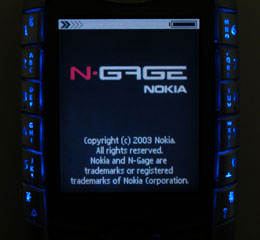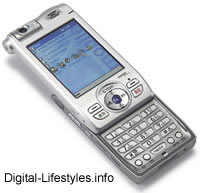The world of introducing convergent devices is a tricky one. Following on the heals of their combined music player/mobile phone, Nokia launched their mobile phone/music player/games machine, the N-Gage, in October and its has been a shaky start. Before its launch, lots of people were less than positive, and following it, the reviews have not been great.
Despite Nokia claiming to have shipped 400,000 units to retailers, the number of customer sales is thought to be low. This has lead to some discounting, to the point where it was available for 1 pence in the UK, if you took a particular service contract out with it.
Nokia will be following the business model for other games platforms, sell the box for a minimum margin (or try to minimise your losses), then make your money in the medium to long term on licensing games for the platform. The same theory as razors and razor blades. Clearly this model only works if you sell the games as well.
Nokia will not like the latest news. A Swedish hacking group claim that they have got around the protection system that ensures that N-Gage games only play on the N-Gage. They have showed photos of the some N-Gage games running on a Siemens SX1, it’s not clear if these are mock-ups or real.
 If true, the impact is far reaching. Games written for the N-Gage will run on any phone running the Symbian operating system and according to Symbian, over 2.68 million handsets were shipped with their OS in the first half of 2003.
If true, the impact is far reaching. Games written for the N-Gage will run on any phone running the Symbian operating system and according to Symbian, over 2.68 million handsets were shipped with their OS in the first half of 2003.
The damage does not stop with them only losing sales of the N-Gage hardware, but that once the games have been extracted from the N-Gage and are stored digitally unprotected, people will be able to download them – not have to buy them for between $35-$40 each.
 BT have joined up with a partner, Ringtones Online, to offer ringtones, graphics and games for mobile phones. Potential customers will be able to freely browse a dedicated website on the street using the BT Internet Kiosks, then select, preview and purchase their choices. Payment can either be by inserting cash directly into the machine or electronically using credit card, text or by calling a premium rate phone number. Customer will pay £2 for the content, expect for games, which will be £4.50. By offering them from the street they are hoping to encourage the impulse purchasing.
BT have joined up with a partner, Ringtones Online, to offer ringtones, graphics and games for mobile phones. Potential customers will be able to freely browse a dedicated website on the street using the BT Internet Kiosks, then select, preview and purchase their choices. Payment can either be by inserting cash directly into the machine or electronically using credit card, text or by calling a premium rate phone number. Customer will pay £2 for the content, expect for games, which will be £4.50. By offering them from the street they are hoping to encourage the impulse purchasing. LG Electronics have unveiled their latest mobile phone, incorporating a PDA and 1.1 mega pixel camera which can record one hour of video.
LG Electronics have unveiled their latest mobile phone, incorporating a PDA and 1.1 mega pixel camera which can record one hour of video. Back in 1999, Sony brought out the first digital photo frame, not that you would probably know about it as there aren’t that many around – it cost $900. Since then many more companies have brought them out for considerably less that Sony’s initial offering, many of them new companies but also from more well know brands such as Kodak.
Back in 1999, Sony brought out the first digital photo frame, not that you would probably know about it as there aren’t that many around – it cost $900. Since then many more companies have brought them out for considerably less that Sony’s initial offering, many of them new companies but also from more well know brands such as Kodak.